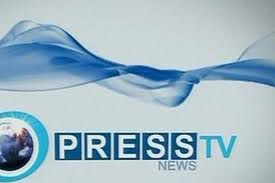Marie Colvin, Nicholas Davies, Gareth Montgomery-Johnson and the journalism of attachment
 PRESS TV, Iran’s English-speaking mouthpiece supported Colonel Muammar Gaddafi during the so-called Libyan spring. Now in that country, Press TV’s Nicholas Davies, a reporter, and Gareth Montgomery-Johnson, a cameraman, have been kidnapped / seized / arrested by the Misrata Brigade in Misrat. Both men are British. Why they were arrested, we do not know.
PRESS TV, Iran’s English-speaking mouthpiece supported Colonel Muammar Gaddafi during the so-called Libyan spring. Now in that country, Press TV’s Nicholas Davies, a reporter, and Gareth Montgomery-Johnson, a cameraman, have been kidnapped / seized / arrested by the Misrata Brigade in Misrat. Both men are British. Why they were arrested, we do not know.
Press TV issues a statement:
Local Libyan militiamen have arrested the reporter and cameramen working for the English-language Press TV news network in the western city of Misratah. The pair, indentified as Nicholas Davies and Gareth Mongomery-Johnson, were seized along with two local residents, indentified [sic] only by their first names Muhammad and Assad, by the Misratah Brigade members on Tuesday morning, and are currently being held in custody in the Libyan capital Tripoli.…The incident is latest in a series of reported abuses by Libyan militiamen, who overthrew slain dictator Muammar Gaddafi after more than 41 years of despotic rule.
We hope the men are safe and well. One question though: what role are journalists playing in troubled Arab lands?
Brendan O’Neill writes:
…I can’t help wondering if Marie Colvin’s death points to inherent dangers in the sort of journalism she pursued. No, not war reporting, which will always be a risky business, but the “journalism of attachment”…The “journalism of attachment” was described by its kind-of founder Martin Bell, the BBC’s veteran, white-suited war correspondent, as journalism which “cares as well as knows”.
Journalists, said Bell in the mid-1990s, had a new “moral obligation” to distinguish between “good” and “evil” in conflict zones, and if necessary to take sides. That is, they should ditch the pretence of neutrality and express an emotional “attachment” to the good guys in any given conflict.
The thing is, however, if journalists allow themselves to become moral combatants, crusaders against “evil” rather than mere reporters of fact, is there not a danger that they will be treated as combatants?…
Indeed, in his obit of Colvin, published in The Times, Bell said that journalists like her and him were keen to make it “harder for governments to remain inactive or indifferent”. For example, he says, without the journalism of attachment that emanated from Libya last year, “the English and French would not have done what they did” – launch a bombing campaign in Libya.
In other words, there is a direct line, in Bell’s view, between the new attached, emotional journalism and actual Western military interventions. So this really is “more than reporting” – it is frequently a rallying cry for external military support for those judged to be “good”, against those considered “evil”.
Yet is it possible that Assad, like other ruthless rulers, now targets foreign reporters because they are actually “more than reporters”? Because, in their own words, their aim is sometimes to shift the course of wars and invite Western invasions?
The talk is of freedom and truth but isn’t it just biased reporting? Press TV has an agenda. The BBC has an agenda. If one side doesn’t like what’s being reported, the word “PRESS” on the back of the reporter’s vest is no defence against attack…
Posted: 24th, February 2012 | In: Reviews Comment | TrackBack | Permalink


